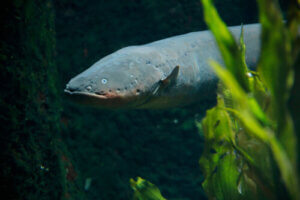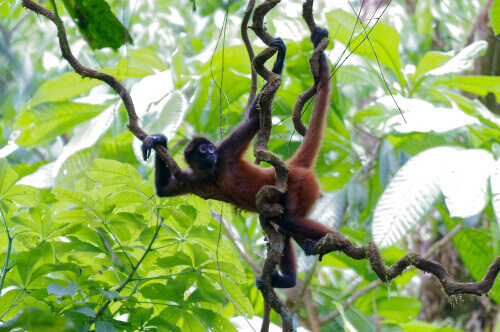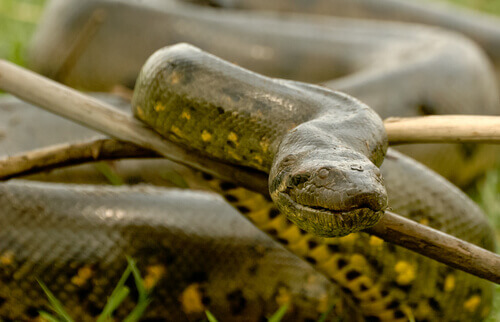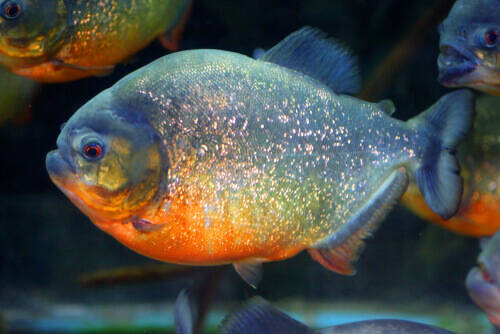The Amazon Rainforest and Its Fauna

If there’s a place rich in fauna and flora in the world, it’s the Amazon rainforest and its surroundings. The humidity caused by the river, together with the torrential rains in the countries it spans, allow various species of animals to live there. If you want to know all about them, don’t miss this article.
Learn a little more about the Amazon
The Amazon is the largest river in the world flowing through Peru, Colombia and Brazil. Around its basin we can find part of the largest forest in the world, the Amazon rainforest, which spans more than seven countries. Here we find animal and plant species that can’t be seen anywhere else in the world.
It’s not surprising that the most adventurous animal lovers dive into this river for a unique experience. As experts don’t agree on the exact points for carrying out measurements —resulting in a margin of 740 km (460 mi)— it seems that the Amazon competes with the Nile in terms of flow and length. Even so, it’s always been said that the Amazon is the longest and fastest-flowing river on Earth.
Given the water scarcity issue worldwide, it’s not surprising that many exotic animals have chosen this basin as their permanent habitat. They don’t only find something to drink, but also food that grows thanks to the great flow of the Amazon.
Species that live only here
The Amazon rainforest is a privileged place for animals, as they can live with no shortages of any kind. There are many species, as we said before, that have chosen it as their home, and many of them can only be seen there. Do you want to get to know some of them? Then join us on this trip!
The Amazon rainforest and its fauna: electric eel
You may have seen it in some movie and been surprised by its impressive beauty. It measures about 2.5 m (8.2 ft) long and can weigh up to 20 kilograms (44 lb). It has a peculiar hunting technique that employs electric shocks of up to 600 volts.
These electrical discharges trigger the admiration of all those who have had the privilege of seeing it on one occasion or another.
The spider monkey
You’ve surely heard about it due to the countless jokes about its name. Well, this name defines it very well. Thanks to its long limbs and tail, it can assume incredible postures – resembling a spider – like no other primate in the world.

One of the curiosities of this animal is that it measures no more than 66 centimeters (2 ft) long. The spider monkey is very small, considering it belongs to the primate family.
In addition to this species, you can see other monkeys in the fauna of the Amazon rainforest such as the black-striped capuchin, Azara’s night monkey, the black howler, the Peruvian spider monkey, and the black-tailed marmoset.
The anaconda
We’ve all heard many things about the anaconda, but very few of us will have seen one. It can measure up to 9 m (30 ft) long and weigh up to 200 kg (440 lb), which makes it the largest snake in the world.

There are anacondas in many parts of the world, but the green anaconda lives exclusively in the Amazon rainforest. It’s stealthy and agile in water, but extremely clumsy on land.
The red-bellied piranha
Red-bellied piranhas abound in the Amazon and, although they’re no bigger than a society finch, they always travel in huge schools. So, if someone falls close to one, they’ll attack en masse, and could eat a person in under a minute. Scary!

Unlike sharks, they don’t need blood to find their prey and even a simple splash caused by a fall is more than enough to catch their attention.
So, we hope you’ve enjoyed finding out about the Amazon rainforest and its fauna, one of the richest natural places in the world. Are you up for a vacation in the area to get to know some of these species?
If there’s a place rich in fauna and flora in the world, it’s the Amazon rainforest and its surroundings. The humidity caused by the river, together with the torrential rains in the countries it spans, allow various species of animals to live there. If you want to know all about them, don’t miss this article.
Learn a little more about the Amazon
The Amazon is the largest river in the world flowing through Peru, Colombia and Brazil. Around its basin we can find part of the largest forest in the world, the Amazon rainforest, which spans more than seven countries. Here we find animal and plant species that can’t be seen anywhere else in the world.
It’s not surprising that the most adventurous animal lovers dive into this river for a unique experience. As experts don’t agree on the exact points for carrying out measurements —resulting in a margin of 740 km (460 mi)— it seems that the Amazon competes with the Nile in terms of flow and length. Even so, it’s always been said that the Amazon is the longest and fastest-flowing river on Earth.
Given the water scarcity issue worldwide, it’s not surprising that many exotic animals have chosen this basin as their permanent habitat. They don’t only find something to drink, but also food that grows thanks to the great flow of the Amazon.
Species that live only here
The Amazon rainforest is a privileged place for animals, as they can live with no shortages of any kind. There are many species, as we said before, that have chosen it as their home, and many of them can only be seen there. Do you want to get to know some of them? Then join us on this trip!
The Amazon rainforest and its fauna: electric eel
You may have seen it in some movie and been surprised by its impressive beauty. It measures about 2.5 m (8.2 ft) long and can weigh up to 20 kilograms (44 lb). It has a peculiar hunting technique that employs electric shocks of up to 600 volts.
These electrical discharges trigger the admiration of all those who have had the privilege of seeing it on one occasion or another.
The spider monkey
You’ve surely heard about it due to the countless jokes about its name. Well, this name defines it very well. Thanks to its long limbs and tail, it can assume incredible postures – resembling a spider – like no other primate in the world.

One of the curiosities of this animal is that it measures no more than 66 centimeters (2 ft) long. The spider monkey is very small, considering it belongs to the primate family.
In addition to this species, you can see other monkeys in the fauna of the Amazon rainforest such as the black-striped capuchin, Azara’s night monkey, the black howler, the Peruvian spider monkey, and the black-tailed marmoset.
The anaconda
We’ve all heard many things about the anaconda, but very few of us will have seen one. It can measure up to 9 m (30 ft) long and weigh up to 200 kg (440 lb), which makes it the largest snake in the world.

There are anacondas in many parts of the world, but the green anaconda lives exclusively in the Amazon rainforest. It’s stealthy and agile in water, but extremely clumsy on land.
The red-bellied piranha
Red-bellied piranhas abound in the Amazon and, although they’re no bigger than a society finch, they always travel in huge schools. So, if someone falls close to one, they’ll attack en masse, and could eat a person in under a minute. Scary!

Unlike sharks, they don’t need blood to find their prey and even a simple splash caused by a fall is more than enough to catch their attention.
So, we hope you’ve enjoyed finding out about the Amazon rainforest and its fauna, one of the richest natural places in the world. Are you up for a vacation in the area to get to know some of these species?
This text is provided for informational purposes only and does not replace consultation with a professional. If in doubt, consult your specialist.








